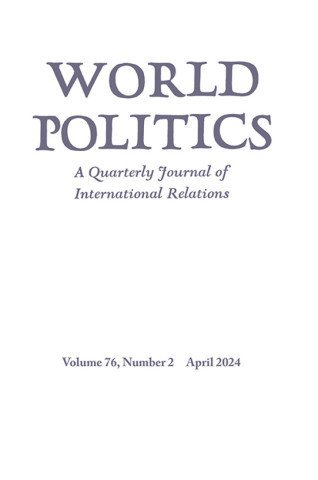军事组织中的实践意识形态
IF 2.5
1区 社会学
Q1 INTERNATIONAL RELATIONS
引用次数: 15
摘要
意识形态塑造了好战分子的招募、组织和冲突行为。现有的研究假设理论的一致性,自上而下的追随者社会化,以及形式意识形态和政治行动之间的明确联系。但人们早就认识到,意识形态上的承诺不会不受总体分歧或精英叙事的影响;它们是不平衡的、偶然的、充满张力的,而且常常是矛盾的。如果意识形态没有被深入研究、内化或真诚地相信,它在激进组织中能起什么作用呢?学者们如何解释武装分子的集体承诺、亲和力和行为结果,这些武装分子显然与一个组织有联系,但可能并不始终(或从未)是真正的信徒或坚定的空想家?我认为实用的意识形态——反映关系世界观的日常原则、思想和社会启发的集合,而不是具体的公开的政治学说、立场、纲领或计划——在通过日常实践的战斗社会化中发挥着关键作用。从黎巴嫩巴勒斯坦人的田野调查中获得的民族志证据表明,武装分子及其附属机构如何通过情感、智力和道德诉求,使意识形态上的亲近和距离变得容易接近。这种方法重申了话语和叙事在不明确援引正式教义的情况下创造战斗社会化非正式机制中的作用。本文章由计算机程序翻译,如有差异,请以英文原文为准。
Practical Ideology in Militant Organizations
Abstract Ideology shapes militant recruitment, organization, and conflict behavior. Existing research assumes doctrinal consistency, top-down socialization of adherents, and clear links between formal ideology and political action. But it has long been recognized that ideological commitments do not flow unaltered from overarching cleavages or elite narratives; they are uneven, contingent, fraught with tension, and often ambivalent. What work does ideology do in militant groups if it is not deeply studied, internalized, or sincerely believed? How can scholars explain collective commitment, affinity, and behavioral outcomes among militants who clearly associate themselves with a group, but who may not consistently (or ever) be true believers or committed ideologues? I argue that practical ideologies—sets of quotidian principles, ideas, and social heuristics that reflect relational worldviews rather than specific published political doctrines, positions, platforms, or plans—play a key role in militant socialization through everyday practices. Ethnographic evidence gained from fieldwork among Palestinians in Lebanon demonstrates how militants and affiliates render ideas about ideological closeness and distance accessible through emotional, intellectual, and moral appeals. This approach reaffirms the role of discourse and narrative in creating informal mechanisms of militant socialization without expressly invoking formal doctrine.
求助全文
通过发布文献求助,成功后即可免费获取论文全文。
去求助
来源期刊

World Politics
Multiple-
CiteScore
8.40
自引率
0.00%
发文量
24
期刊介绍:
World Politics, founded in 1948, is an internationally renowned quarterly journal of political science published in both print and online versions. Open to contributions by scholars, World Politics invites submission of research articles that make theoretical and empirical contributions to the literature, review articles, and research notes bearing on problems in international relations and comparative politics. The journal does not publish articles on current affairs, policy pieces, or narratives of a journalistic nature. Articles submitted for consideration are unsolicited, except for review articles, which are usually commissioned. Published for the Princeton Institute for International and Regional Affairs
 求助内容:
求助内容: 应助结果提醒方式:
应助结果提醒方式:


